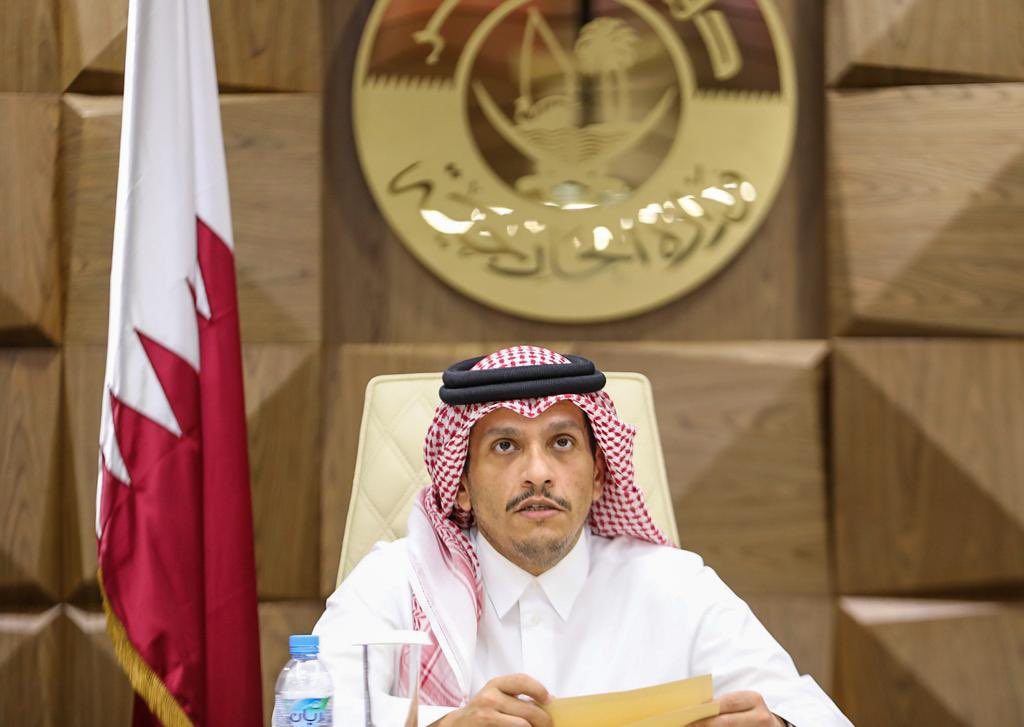The Qatari official spoke about Iran’s ties with the GCC and Afghan women’s rights.
Qatar’s Foreign Minister Sheikh Mohammed bin Abdulrahman Al-Thani has called for the need to address Lebanon’s political divide to resolve its decades-long crises. This came during an interview with Newsweek’s podcast, The Diplomat, recorded when Sheikh Mohammed was in DC last month.
When asked about Lebanon’s socio-economic turmoil, the Qatari official said that sectarianism has largely contributed to the country’s current state.
“Unfortunately, the people of Lebanon are being under a lot of political pressure from their own political leaders. This is what resulted at the end of the day with what we have seen now with these divisions.”
The Qatari diplomat also stressed how foreign intervention has confounded divisions in Lebanon. “[Lebanon] became more and more subject to fueling by foreign forces. This is not helpful and the only part suffering is the Lebanese people,” he said.
Lebanon has become an arena where rivalry between Saudi Arabia and Iran has been played out, with Riyadh backing some Sunni and Maronite groups and Tehran supporting the Shia Hizbullah movement.
In 2017, that foreign interference became more apparant than ever when then-Prime Minister, Saad Hariri was summond to Saudi Arabia and reportedly forced to resign.
Speaking about efforts to find to find a diplomatic solution in Lebanon, Sheikh Mohammed said the sectarian system remains a burden. “We see some of the political leaders with a desire to change, but unfortunately there’s something in the system that’s holding everyone back.”
The Qatari official believes the only viable solution for the country’s crises is genuine political reform and a national system.
“The only solution for Lebanon is to have a real political reform and to form a system that is a national system, that doesn’t qualify people based on their sect or based on their background. But based on their real work qualifications.”
Lebanon is made up of various social segments, including Shia Muslims, Sunni Muslims, Druze, Maronites, and other sects of Christianity. In 1975, various engaged in a bloody civil war that lasted for 15 years. Although it ended, its remnants have lingered, with Lebanese officials continuing to serve their own interests. In 2019, mass protests broke out in Lebanon over the lack of basic resources. The people repeated the words “all means all” (kellon ya’ani kellon), calling on leaders to step down. The country’s situation deteriorated since the Covid-19 outbreak and tragic Beirut blast on 4 August, 2020.
The Lebanese currency took a great hit since 2019 and people in Lebanon were unable to access their money at banks. Beirut is also battling an electricity crisis, with most parts receiving two hours of power per day. On Tuesday, Lebanon’s government approved $18 million to hold a parliamentary election in May, its first since the protests took place.
Qatar previously pledged to help the country once it forms a new government.
On Iran
Commenting on talks aimed at restoring the 2015 nuclear accord, Sheikh Mohammed said that the only option is to have a deal with Iran. “We don’t want to see a nuclear arm race happening close to us, close to our country. He added that Qatar is in favour of peaceful nuclear programme.
Talks to restore the Joint Comprehensive Plan of Action (JCPOA) kicked off in April last year. Despite resuming following the election of Iran’s President Ebrahim Raisi, they have yet to reach a major breakthrough. Responding to a question over Iran-GCC dialogue, Qatar’s foreign minister expressed the importance of holding direct talks.
“As the Gulf countries have some concerns from Iran, the Iranians themselves have their own concerns from the Gulf countries. So we need to address their concerns diplomatically and we’ve been calling for this for years.”
Taliban delegation in Qatar for talks with GCC and EU officials
Since the signing of the Al-Ula Accord after the three-year GCC crisis, Qatar offered to mediate between the UAE and Iran. It made the same offer regarding Riyadh and Tehran. The UAE and Riyadh both have been holding talks with Iranian officials in recent months. This was seen as a significant step following years of rivalry.
Qatar has long expressed its stance in resolving conflicts through diplomacy.
On Afghanistan
Qatar’s Foreign Minister said that it continues to ensure that Afghanistan remains stable following the Taliban’s takeover.
“We don’t want to see Afghanistan going backwards, we don’t want to see whatever achievements from the last 20 years to be reversed,” he said.
The Gulf state has been encouraging dialogue between the US, EU and the interim Afghan government. It repeatedly called on the international community to not isolate Afghanistan due to their disagreement with the Taliban. Sheikh Mohammed said that they have yet to witness major progress regarding the Taliban’s promises over women’s rights.
“We have seen some small steps, which are not that much significant, but we keep pushing the Taliban to do more and to make sure women are allowed to go back to their workplace and practice their lives normally.” He said that the situation regarding women’s rights is caused by the Taliban’s rule and socio-economic factors.
“Mainly we have been seeing people living in the cities, but also we should not neglect that a lot of the Afghan population are living in villages and remote regions who are still maintaining the same customs and the same culture,” he said.
“I think that a country that has been in a war for 20 years, it’s difficult to just address one social issue for them and not being able to be helpful in all other issues,” added Sheikh Mohammed.
Follow Doha News on Twitter, Instagram, Facebook and Youtube







